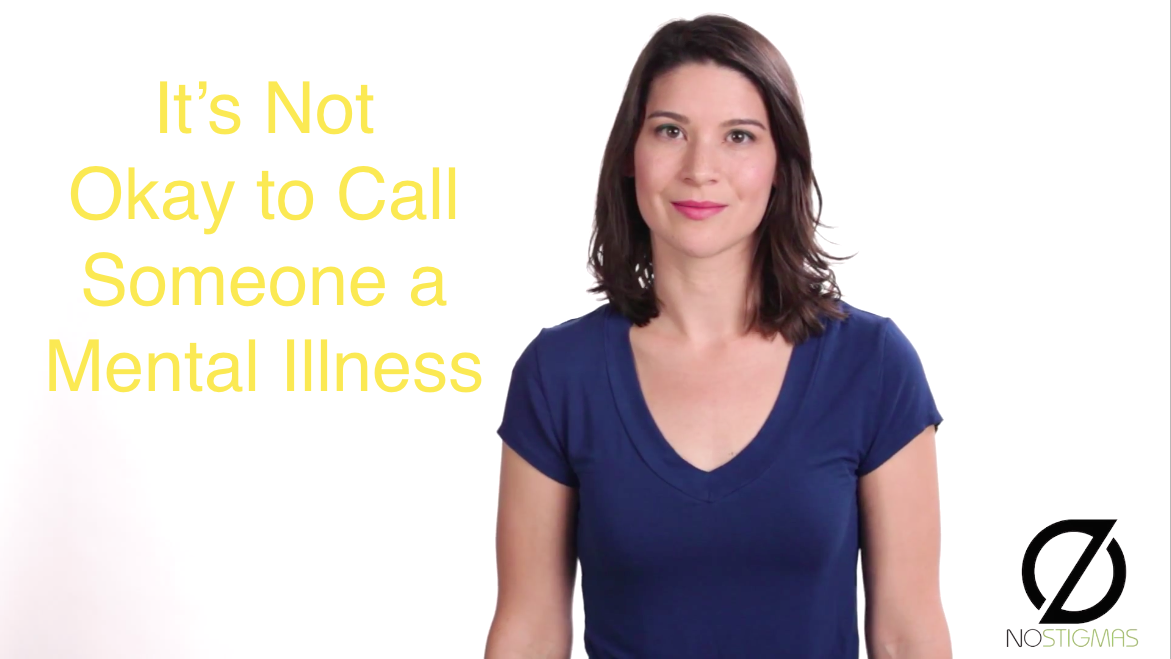While 99.99% of people suffering from mental health conditions never become violent, I hope someday people become less afraid to take an action when they see extremely bizarre behavior or hear someone speaking violently. In these situations I always suggest engaging professionals right away. Don't play the role of the police or mental health professional.
Viewing entries tagged
mental illness
In addition to being part of a healthy support system, peer support programs provide a multitude of benefits.
How often do we just casually diagnose one another?
"He's so OCD."
"OMG, she's so bipolar!
"I feel so schizophrenic."
Ya know, it's not okay to call someone a name and it's definitely not okay to cal someone a mental illness.
Who decided that a cry for help is a bad thing? When someone talks about self harm or suicide, that is them trying to get attention. And we need to give them our undivided attention so that they can be heard and get the support they need.
Mental illness can affect anyone. It's the stigmas about it that segregate and divide us.
Post-traumatic stress disorder, or PTSD, is a type of anxiety disorder that typically develops after the experience of a traumatic event. PTSD is severely disruptive. People who suffer from PTSD may have nightmares, flashbacks, or fear that they are in danger even when no threat is present. These feelings are often brought on by triggers, things that bring back memories of the traumatic event. Triggers can be either internal (thoughts, feelings, memories) or external (situations, objects, words).People with PTSD may also experience guilt or anger about the event, which might lead to maladaptive coping behaviors such as excessive alcohol or drug use. While PTSD has been more recently associated with veterans of war, it can happen with any sort of traumatic event.
A serious health concern that often goes unnoticed is the alarming presence of mental illness on college campuses.
Caregivers are often people who are there to provide support and help for people who can’t live their lives under “normal” circumstances, or people who need others’ assistance to complete their day-to-day activities. Other than children or the elderly, the people who need help from caregivers are classified as the “chronically ill”. Caregivers exist to help people with chronic illnesses that create severe life impairment complete their day-to-day activities, and also improve their mental well-being. Caregivers come in all shapes and sizes, from all kinds of backgrounds or ethnicities, and provide care for many different reasons.
Comorbidity typically refers to a condition "existing simultaneously with and usually independently of another medical condition". This can be any combination of illnesses or conditions, whether mental, physical, or perceived, that almost always make the patient’s lives more challenging and worsen their life quality.
Seasonal Affective Disorder is a mood disorder that is classified by depressive symptoms that occur within the same season each year, usually winter. It is commonly thought that SAD is the result of biochemical imbalances that occur with shorter daylight hours lessening amounts of sunlight. As seasons change, people experience a shift in their biological internal clock or circadian rhythm that can cause them to be out of step with their daily schedule. A second, less common type of seasonal affective disorder occurs in the summer months in individuals who live in warmer climates. This type of depression is related to heat and humidity, rather than light.
In a first-of-its-kind study published in the American Journal of Affective Medicine in 20132, five researchers reported their conclusion that, across all major mental health issues (sorted here as Attention Deficit Hyperactivity Disorder, general anxiety, major depression, eating disorders, Obsessive Compulsive Disorder, schizophrenia, and suicide), information searches about mental health issues on Google peak high during the winter months and drop to a significantly lower level during the summer.
Approximately seven million Americans have enrolled in public health insurance since the Affordable Care Act was initiated in 2013. Through the recently revamped Health Insurance Marketplace, nearly one million more Americans have gained health coverage since Thanksgiving.
As the end of 2014 approaches and important deadlines creep closer, we've provided ten things consumers should know about the Health Insurance Marketplace for 2015.
- United States' citizens, lawful nationals, and immigrants with an approved status are eligible to shop for health insurance using the Health Insurance Marketplace.
- The last day to enroll in Marketplace coverage that will begin as soon as January 1, 2015, is December 15, 2014. February 15, 2015, is the last day to sign up for public health insurance for 2015. Grace periods may be approved in rare circumstances (check here after January 1st). Members of federally recognized tribes or Alaska Native Claims Settlement Act Corporation (ANCSA) shareholders may enroll in Marketplace coverage any time of the year.
- Alas! Public health plans purchased through the Health Insurance Marketplace do not deny coverage based on pre-existing conditions.
- Marketplace insurance plans are parity protected. What does "parity protected" mean?
- Financial requirements for mental health services must be equal to or lesser than those required for most medical services. For example, you cannot be charged a co-payment of $40 for an office visit to a psychologist and $20 for an office visit to a medical doctor if the sum cost for all of your used medical services totals less than $40.
- Insurers cannot put a firm limit on the number of treatment sessions that are covered in a health plan. Care is evaluated on a case-by-case basis for "medical necessity" according to criteria established by treatment and insurance providers.
- A single deductible now applies to both mental health treatment services and medical treatment services. Prior to the parity law, insurance plans could require patients to meet different deductibles for mental health services and medical services. A deductible is the overall amount patients pay out-of-pocket per year before health insurance makes any payments.
- More good news for mental health! All insurance plans purchased through the Health Insurance Marketplace include mental health and substance use disorder services as an essential health benefit. An essential health benefit is part of a comprehensive package of services that must be covered in a health plan. In the individual and small group markets, both inside and outside of the Health Insurance Marketplace, essential health benefits are guaranteed.
- The other 9 essential health benefits: ambulatory services (outpatient services you can get without being admitted to a hospital); emergency services; hospitalization (e.g., surgery); pregnancy, maternity and newborn services (e.g., neonatal care); prescription drug services; rehabilitative services; laboratory services (e.g., HIV testing, blood work); preventative and wellness services (e.g., screening for alcohol misuse, blood pressure, depression, diet, tobacco use, etc.); and pediatric services (i.e., primary care for children).
- You may be eligible for savings on Marketplace health insurance depending on your income and household size. Individuals with annual incomes below $46,680, and families of four with incomes below $95,400, will generally qualify for savings. This chart will guide you in discovering if you or your family qualify for low-cost health coverage. Children may be enrolled in their parents' health plans, inside or outside of the Health Insurance Marketplace, until age 26.
- The Marketplace Call Center is open 24 hours a day, 7 days a week. Call to start an application, seek help completing an application, compare health plans, or ask a question.
- Click here to browse Marketplace insurance options for 2015. Enter your United States zip code and you will be taken to the unique "shopping site" for your home state. Before electing to enroll in a health plan, be sure to have all necessary documents prepared and gathered.
- For personalized, local help: Try here.
Learn more about insurance and the Affordable Care Act in our Learning Center.
The prevailing perceptions of “macho” masculinity and what it means to be “a man” in America have long overshadowed critical issues related to men’s mental health -- until now. NoStigmas wants to talk about you, guys!
We know that mental health issues do not discriminate by gender. Depression, anxiety, bipolar disorder, eating disorders and other major mental health issues similarly affect both men and women. So why are men, on average, three times more likely than women to die by suicide?
Accurately recognizing the warning signs of a mental health condition is sometimes difficult, and sometimes men (and women) are not in-tune with their emotions. Men may feel added social pressures to be bold, confident, and stoic. Popular culture reinforces the image of the “masculine man” as powerful, courageous, competitive and successful.
While these traits are admirable, they are deserving of compromise. The social construction of masculinity is problematic because it does not leave room for anxieties, doubts, misconceptions or struggles. Reality tells us that life is full of little (and big!) anxieties and struggles. We want to help our men prioritize their mental health habits and manage their “emotional teaspoons”. Let’s #RedefineNormal and let our men know - You are not alone.
- DO talk to a loved one, a trusted friend, or a professional health provider at the first indication of a mental health issue. Talk to us, even! You can request a NoStigmas mentor here.
- DO maintain a healthy diet and engage in moderate physical activity 2-3 times a week. Watching your waistline and other key health numbers (like blood pressure and cholesterol) will also benefit your long-term health. Check out the 6 biggest trend shifts in fitness here.
- DO reflect on yourself. This is essential to self-management! Take time out of your day to think and reflect on present irritations, hopes and pleasures, and immediate or future plans. If a journal isn’t quite your style, try taking this step and installing this personal health template from Microsoft Office to your personal computer. It downloads directly to Microsoft Excel, and the rest is health history!
- DON’T consume excess alcohol. If you choose to drink alcohol, do so only in moderation. For men younger than age 65, alcohol consumption is considered moderate if individuals consume up to two drinks per day. One drink is equivalent to a 12 oz. beer, a 5 oz. glass of wine, or a 1.5 oz. shot (80 proof).
- DON’T mess with your sleep schedule. Our quality of sleep influences how much food we consume, our metabolism speed, and how well we cope with our stress. Check out these 7 steps to better sleep.
- DON’T use tobacco products. Smoking is among the unhealthiest vices known to man. To pick up a healthier habit, try these mediation tips for beginners.
Visit our Learning Center to learn more about men's mental health! Also, check out some other "manly" support systems:
Post-traumatic stress disorder is not the only mental health issue among military veterans and active personnel. What are some other mental health problems and how can we help?
In the U.S., approximately five million men experience depression in a given year. Male depression is a serious mental disorder and needs immediate treatment. Yet, it often goes untreated and underdiagnosed in men.
BARRIER #1: ATTITUDINAL BARRIERS
Attitudinal barriers commonly cause those living with mental illness to avoid seeking mental health services. These attitudinal barriers can include believing that a mental illness will resolve on its own or not believing in the beneficial aspects of psychiatric care.
As an example, look to a 2009 Psychiatric Services study which examined needs for mental health services in a sample of 272 veterans who met screening criteria for a mental health condition. Researchers found that negative beliefs about mental health services were strongly associated with concerns about barriers to care and an increased perception of mental illness stigma. Negative beliefs about mental health care were also associated with a decreased likelihood of mental health counseling in the six months prior to interview.
Can attitudinal barriers be adjusted?
Educational interventions introduced throughout the early school years could work to develop a better publicly-shared understanding about mental illness. Ideally, educational interventions would orient children and young adults toward social inclusion and pro-social action. Programs introduced during the final years of high school could include contact with a person living with mental illness; this person could contribute to the intervention process on a voluntary basis by sharing her/his experience of living with a mental health condition. Interventions successful in aiding the development of empathy toward those with mental illness may prove successful in removing attitudinal barriers toward mental health issues and treatment.
Strengthening support in local communities could be facilitated by the creation of weekly or monthly community meetings centered around mental health and well-being. Meetings would bring community members together with the shared goals of spreading information about mental health issues and resources, bolstering public support, and creating community bonds. If a wellness group is missing in your community, consider discussing with friends, family or town board members the possibility of starting a mental health and wellness group near you. The number of interested people may surprise you!
Note: Some organizations, such as NoStigmas and Mental Health America, provide a link for locating mental health support facilities across the country.
[button color="#8ba33b" size="small" link="https://www.nostigmas.org/mental_health_barrier_2/"]BARRIER #2: MENTAL ILLNESS STIGMAS -->[/button]
Overview
Starting in 2014, the Affordable Care Act (sometimes referred to as Obamacare) will begin to take effect. A comprehensive summary of the entire Act can be found here, but here’s a quick overview of some of the changes that will take place:
- Comprehensive and accessible treatment options
- Coverage for pre-existing conditions
- No more dropped coverage due to illness
- More access to preventative care
- Restrictions on lifetime and annual limits
- Coverage for young adults under parents’ plan until age 26
- More access to Medicaid**
Affordable Care Act & Mental Health
- There will be increased coverage for mental health services. About20% of people who currently have insurance receive no benefits for treatment of mental illnesses. Treatment, certain prevention services and screening for mental health issues (including substance abuse) will also be covered under the Affordable Care Act.
- Those who are uninsured or underinsured are now able to get coverage. Mental health issues or disorders have previously been a barrier to receiving or affording coverage, as it could be considered a pre-existing condition. After the Affordable Care Act takes effect, pre-existing conditions can no longer factor in availability or cost of coverage.
- Funding for mental health services and centers will increase. The Affordable Care act also mandates that funding for community mental health centers will increase by $11 billion over the next five years, which includes expanding both preventative and behavioral health services. A portion of this funding will also be dedicated to renovation of existing community health centers or the construction of new centers.
- People will now have the opportunity to designate “health homes”. Those who are eligible for Medicaid will be able to assign health homes, which are medical homes for people who have a serious, chronic condition that may require extended care. The goal of these health homes is to integrate all aspects of a person’s care in a way that promotes comprehensive wellness.
Uninsured?
Immigrant or Undocumented?
How to sign up
Meditation is a form of complementary and alternative medicine. There are numerous reasons to practice meditation. One common reason is for health related purposes. In fact, some people use this therapy to cope with illnesses. It is a great stress reliever that can be used to increase calmness and physical relaxation. Mediation can also improve practitioner’s psychological balance in aiding with the treatment of Depression and Anxiety disorders such as conversion disorder. By practicing meditation, one can approach their thoughts and emotions more positively. It can refine practitioner’s ability to focus their attention as well. Recently, the National Center for Complementary and Alternative Medicine (NCCAM) studies reveal that meditation can also improve attention-related abilities. This is very useful to those with Attention Deficit Hyperactivity Disorder or Attention Deficit Disorder.
According to the NCCAM, previous research has demonstrated that mindfulness meditation may reduce symptoms of anxiety and depression as well. This form of meditation focuses attention on breathing techniques to develop increased awareness of the present. A study was completed about meditation and it’s affect on the brain utilizing a mindfulness-based stress reduction. The study’s purpose is to distinguish specific brain regions of the participants. The results showed that “Brain images in the meditation group revealed increases in gray matter concentration in the left. The hippocampus is an area of the brain involved in learning, memory, and emotional control, and is suspected of playing a role in producing some of the positive effects of meditation.” This proves that an underlying brain mechanism is associated with the mindfulness meditation in mental health. Overall, meditation can be great tool to help aid in treating mental illnesses. It would work best used in combination with other treatments. Meditation should not be used as a replacement for conventional care or as a reason to postpone seeing a doctor about a medical problem.
[tabs][tab title="Depression"] (Def.):" a mood disorder marked especially by sadness, inactivity, difficulty with thinking and concentration, a significant increase or decrease in appetite and time spent sleeping, feelings of dejection and hopelessness, and sometimes suicidal thoughts or an attempt to commit suicide." (Medline Plus Dictionary)
- Trazodone
- Amoxapine
- Olanzapine (Zyprexa)
- Aripiprazole (Abilify)
- Nortriptyline
- Protriptyline
- Carbamazepine
- Fluvoxamine
[/tab]
[tab title="Anxiety"] (Def.)": any of various disorders (as panic disorder, obsessive-compulsive disorder, a phobia, or generalized anxiety disorder) in which anxiety is a predominant feature—called also anxiety neurosis, anxiety state."(Medlineplus Medical Dictionary)
- Venlafaxine
- Prochlorperazine
- Hydroxyzine
- Clonazepam (Klonopin)
- Alprazolam (Xanax)
- Nortriptyline
- Fluoxetine
- Imipramine (Geodon)
- Carbamazepine
- Citalopram (Celexa)
- Trazodone
- Chlordiazepoxide
- Butabarbital
- Oxazepam
[/tab]
[tab title="Bi-polar Disorder"] (Def.):"any of several mood disorders characterized usually by alternating episodes of depression and mania or by episodes of depression alternating with mild nonpsychotic excitement."(Medlineplus Medical Dictionary)
- Lithium
- Risperidone
- Aripiprazole (Abilify)
- Olanzapine (Zyprexa)
- Carbamazepine
- Valproic Acid
- Symbyax
- Ziprasidone (Geodon)
- Mirtazapine (Remeron)
- Fluoxetine
- Amitriptyline
- Generic lamotrigine
- Phenelzine (Nardil)
- Nortriptyline
- Clomipramine
- Amoxapine
[/tab]
[tab title="ADD/ADHD"] (Def.):"Attention-deficit hyperactivity disorder (ADHD) is a neurobiogical disorder seen in both children and adults that is comprised of deficits in behavioral inhibition, sustained attention and resistance to distraction, and the regulation of one’s activity level to the demands of a situation." (Adhdaware.org)
- Amitriptyline
- Bupropion (Wellbutrin)
- Valproic Acid
- Dextroamphetamine and Amphetamine (Biphetamine)
- Fluoxetine
- Amitriptyline
- Melatonin
- Dextroamphetamine (Dexampex)
- Methylphenidate (Ritalin, Metadate, Concerta, Daytrana)
- Atomoxetine
- Lisdexamfetamine
- Guanfacine (Intuniv)
- Methylphenidate Transdermal Patch
- Dexmethylphenidate
- Zinc
- Fish Oil (Supplement)
- Iron (Supplement)
- SAMe (dietary supplement)
- Pantothenic acid (Vitamin B5)
- Magnesium
- Niacin and niacinamide (Vitamin B3) Supplements
[/tab]
[tab title="Schizophrenia"] (Def.):"a psychotic disorder characterized by loss of contact with the environment, by noticeable deterioration in the level of functioning in everyday life, and by disintegration of personality expressed as disorder of feeling, thought (as in delusions), perception (as in hallucinations), and behavior."(Medlineplus Medical Dictionary)
- Ziprasidone (Geodon)
- Lurasidone
- Paliperidone (Invega)
- Asenapine
- Iloperidone
- Loxapine
- Lithium
[/tab]
[tab title="Eating Disorders"] (Def.) :"any of several psychological disorders (as anorexia nervosa or bulimia) characterized by serious disturbances of eating behavior." (Medlineplus Medical Dictionary)
- Fluoxetine (Prozac)
- Amitriptyline
- Imipramine
- Citalopram (Celexa)
- Zinc
- *Zyprexa
- Prozac
- Paxil
- Xanax
- Naltrexone
- Vitamin A Supplement
- DHEA Supplement
- SAMe (Dietary Supplement)
[/tab]
[/tabs]
























